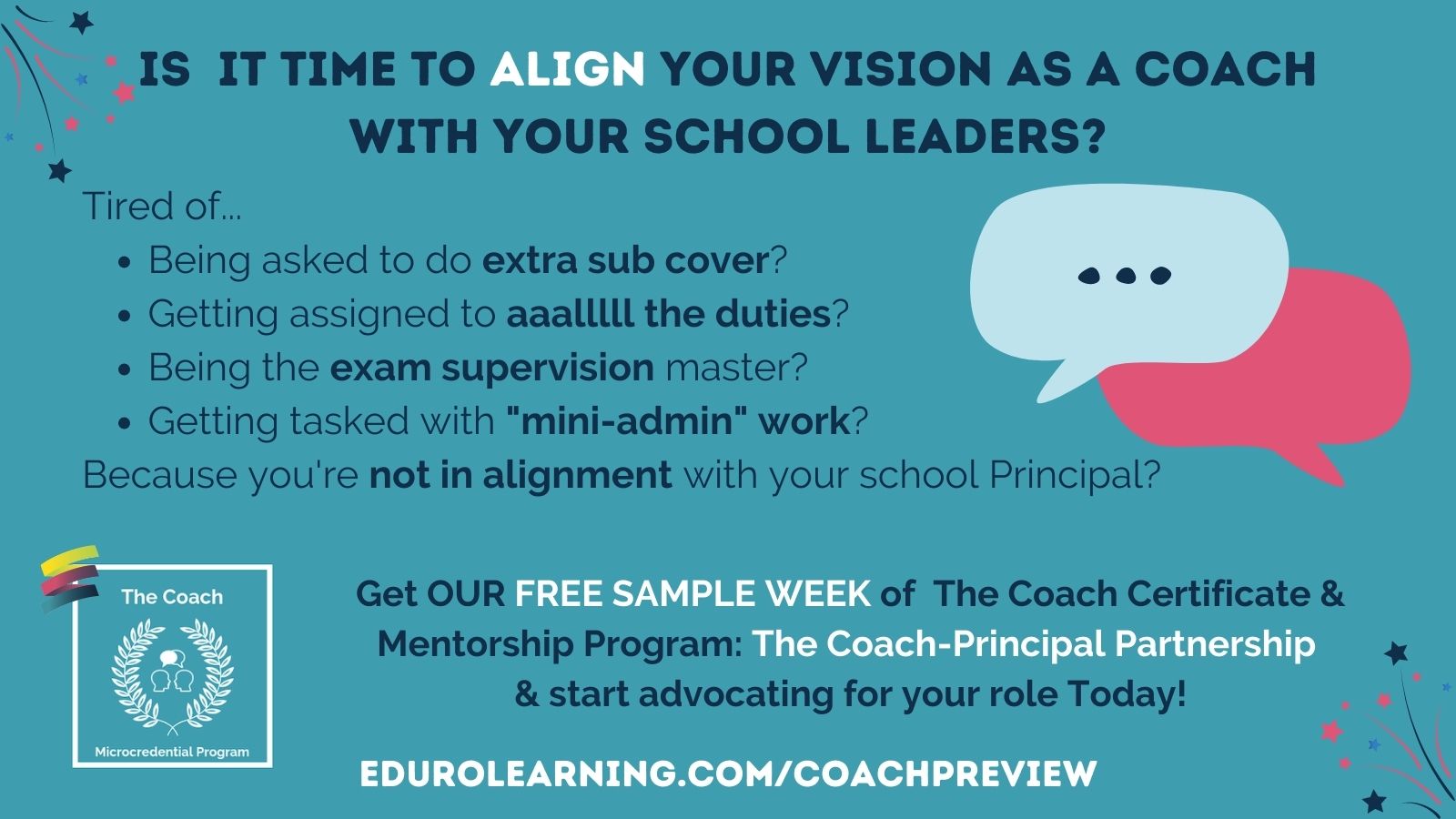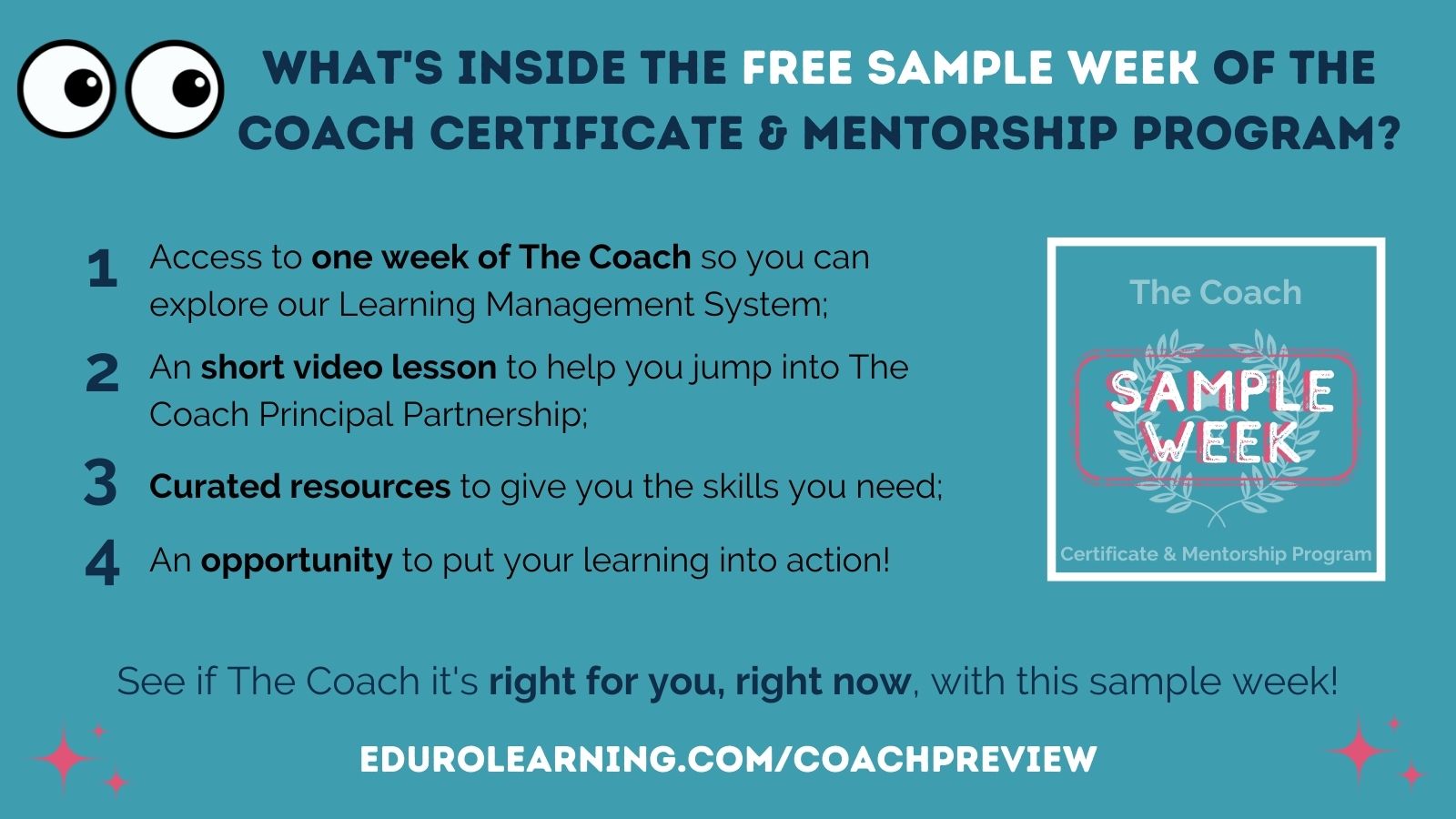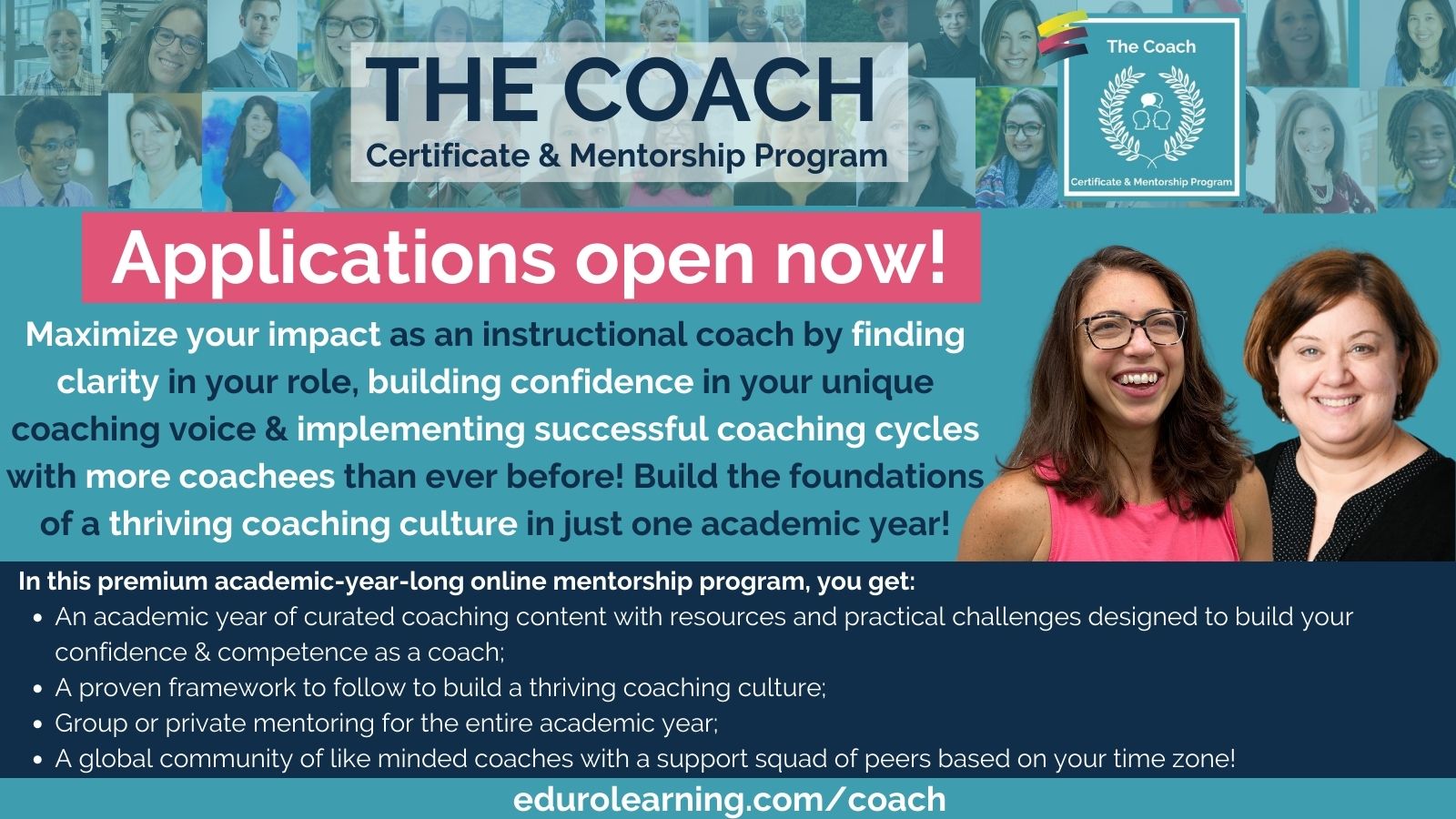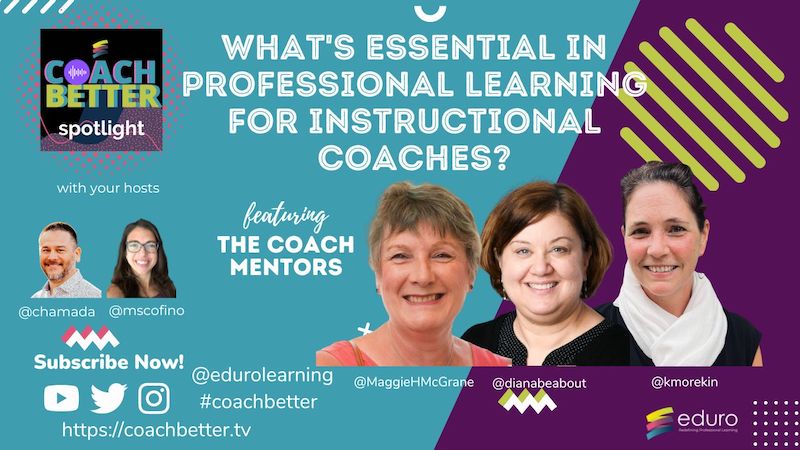In this #coachbetter episode, Diana, Maggie, Kristen, and Kim talk about the essentials of Professional Learning for Instructional Coaches. They talk about the gaps in professional learning that coaches may have when moving from a “more traditional role” in education, what’s unique about the coaching role, how coaches can level up once they’ve been in the role for a while, and the kinds of professional learning that instructional coaches need to be successful in their roles.
This episode is special because they are talking about exactly what makes The Coach so unique – it’s the long-term, practical professional learning with support through our mentorships that make the program special.
Subscribe to #coachbetter via your favorite Podcast Player!
Featured Guests
Bonus! Watch the Spotlight Version on YouTube!
Show Notes
Kristen: MS Lang Arts teacher, in my 13th year I had my first experience as a coach. Have been coaching teachers and leaders for 8 years. Now Director of Teaching & learning
Maggie: Worked in Europe & Asia. Have taught all ages from 3-year-olds to 18-year-olds, PYP, MYP, DP. Have been PYP Coordinator and Director of Tech. For the last 10 years, I’ve been a coach, mostly around tech. Now I visit schools & lead workshops for teachers
Diana: Been an educator for 25 years: teacher, mentor, coach & edtech coach. Worked with all grade levels. Working with multilingual learners
What makes the coaching role unique in schools? What’s new or different about a coaching position for those that come from the classroom?
Maggie: In some situations, I’ve been seen as an expert, and I’ve worked really closely with teachers in a collaborative role. The real difference for me as a coach is this feeling of not being an expert, but being respectful of the fact that each teacher knows their own students, subject or curriculum better than I do. It’s about helping them see the possibilities so they can develop in the role they want to grow. It’s a humble, and respectful role. It’s about recognizing teachers are professionals and that they do know what they want and their students need.
Kristen: People are promoted because they’re experts in the role they were doing and they start to micromanage others because they are better in the previous role, so they fall back on what it is they know how to do. When they move into a coach position, it is about being able to step back and say, “how can I help you to be your best self”. Having a coach is having someone who can listen and empower and make you feel like the most important person in the room. Leads to a sense of self.
Diana: Working with a wide variety of people. Can be exciting and overwhelming. How do you manage all of those different people, and needs. How can you make those opportunities work? What’s the why in the school – sometimes it’s clearly defined and sometimes the coach has to step in and help define that. Shift from the micro lens to big picture.
How can coaches be prepared for these new responsibilities? What are some gaps in professional learning or skill development that they might have – but not realize?
Diana: Being reflective of how I’m interacting with others. We get into these positions because we want to help, so often times our automatic go-to is trying to solve the problem – sometimes before a problem is even presented. Navigating coaching conversations. Give space for the coachee to talk. It’s going to be a learning process for yourself. You might have to train your teachers as well, to get comfortable with coaching conversations – because it might not be natural for them either.
Kristen: Defining the coaching process, and letting them know that a coaching conversation with Diana may not be the same as a coaching conversation with Maggie. Coaching is going to look different because it’s personalized, because it’s differentiated, because your answer to a question might take us in a different direction. It’s not your responsibility to know the curriculum, it’s about being able to ask the questions. Coaches have expertise in solid instruction.
Maggie: There’s things you need to take on, but also things you need to give up. We have to give up being the “fixer” to be successful in the new position. People who move into a coaching role need clarity about what the job entails, and the people in the school need clarity, and the leadership need clarity. Sometimes this involves quite hard conversations with school leaders.
What I had to take on was listening skills. I remember being told right at the beginning, don’t just listen to what people are saying, but listen to the paraphrase, and try and paraphrase the emotion back before you paraphrase what you’re actually saying. It really helps to verbalize the emotion.
Often we think of coaching as forward looking, but a huge part of the role is reflection and looking back. What did work and why? What can we take that forward and apply it to the work we’re going to do.
Once you’re in the coaching position for a while, what can take your practice to the next level?
Maggie: Very intentionally practiced coaching conversations. Role play coaching conversations. Record ourselves having coaching conversations and playing back the videos and look carefully at our body language, and turn the sound off so we’re observing rather than listening. Scribing conversations to see what I might have said to take the coaching deeper. Different states of mind – coaching for the states of mind rather than the actual thing that they want to do.
Kristen: Taking the time for your own reflection, instead of just holding space for others. How much you’re talking compared to how much the coachee is talking, your body language, etc. Having a community to engage with. Often times coaches are alone in their building, finding people who are having similar experiences that you can talk to / learn from, and bouncing ideas off of each other.
Diana: We start in the “what do I do to improve myself?” Once you’re more confident, building that capacity in others. Coaching strategies are not just for coaches. Once you are more comfortable in your role, you can support others growing into a coaching / leadership role. Everyone can coach each other.
Get A FREE WEEK of The Coach Certificate and Mentorship Program
Have you been considering joining The Coach Certificate and Mentorship Program this year, but you’re not sure what you’re going to get?
Would you like to see what learning will be like before you jump in?
It’s a big commitment to join an academic year long program, and we want to make sure it’s the right choice for you right now.
So this year, we’re sharing a sample week of The Coach for FREE for a limited time!

This sample week is one of the “hot topics” that come up in conversations inside The Coach: The Coach-Principal Partnership.
Coaching is such a nebulous word, and even the descriptions we use to discuss why coaching is valuable and how it works can be so broad that we think we’re talking about the same thing…
But we’re not.
This can lead to misunderstandings and misalignment about your role with your school leader. That’s how you wind up doing tons of:
- Sub cover
- Extra duties
- Exam supervision,
- mini-admin-type work
Anything BUT ensuring that there is time for actual coaching.
That’s why this FREE sample week is all about The Coach-Principal Partnership.
You’ll learn how to have a concrete, detailed and actionable conversation with your principal to clearly define your role and expectations so you can focus on actually coaching – and get the support you need to do it well!
Ready to start? Get it at https://edurolearning.com/coachpr

Show Notes (continued)
What do you find coaches often struggle with? New coaches & then experienced coaches? How do you support them?
Diana: Coaches can struggle with the challenge of having so many different opportunities & possibilities, but you have to focus in on what is really going to make the biggest impact & focus your attention and time. Learning how to prioritize, organize and manage all of these projects and ideas. Talking it through, and having a system for organizing.
Kristen: Newer coaches often struggle with a sense of guilt that you’re not doing enough. Helping people recognize that you need time to reflect, to document – and that’s part of your job. Just because you don’t have time blocked on your calendar doesn’t mean you should go do recess duty. It’s an energy shift.
Maggie: You don’t become a coach by having two or three days of PD. Building the community, being able to having coaching conversations with another coach about what you’re doing in your role, so that you’re growing as a coach as well. Being in the global cohort for a whole academic year, you’re always going to have someone there to support you or something else to learn.
What’s essential in PD for coaches? Why is The Coach so valuable / important for coaches seeking professional growth?
Kristen: Ongoing and sustained professional growth. It’s not three days, it’s not one and done. You get to experience your personal growth and development over the course of the year. Be able to have time to reflect on that & think about what might be next.
Diana: Differentiation – where are you and where do you want to go? Self-assessment & what do you need to build to be successful. “This will work for me now, this might work for me later.” Adaptable to what the participants need.
Level Up Your Coaching with The Coach!
If you are ready to develop your coaching practice over the next academic year, and explore topics like transitioning your work from individuals to teams, please join us for our next cohort of The Coach!
Wherever you are in building a coaching culture in your school, The Coach will give you the strategies, skills and tools you need to make coaching a success and will empower you to confidently apply instructional coaching strategies in any situation – from building a coaching program, to having coaching conversations, to being a leader in your school community. We facilitate only one cohort each academic year so we can offer individualized support for each participant.
Registration for our next global cohort opens once a year – check the website for details!

Find out more at: https://edurolearning.com/coach/








Recent Comments